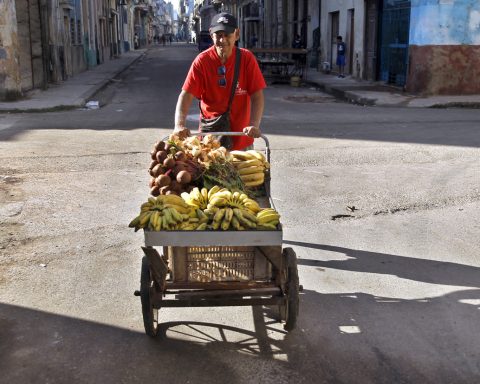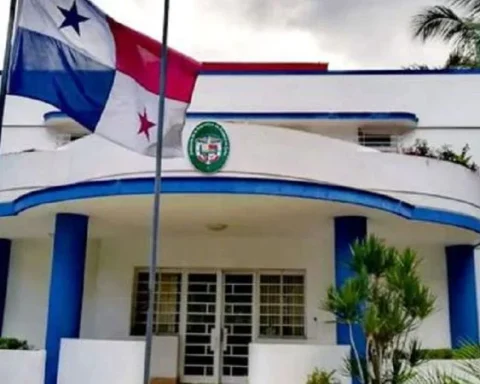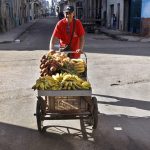A teddy bear with a smiley face peeks out of a dollar store shelf in Havana. Inside the container rests a honey that began its journey in the Cuban fields. The product that the authorities proudly show hardly appears in the markets in pesos, its destination is export or clients with access to foreign currency.
This week the program Round table dedicated one of his broadcasts to beekeeping production on the Island. The space was full of optimistic data and even more rosy future forecasts. But the sweet export figures do not manage to cover the bitter reaction of viewers, upset because the work of bees and producers hardly reaches the national tables.
“A few years ago honey was found in stores that sold in pesos, but with the Ordering Task it disappeared,” laments Lola, a 79-year-old retiree living in the Infanta and Manglar area of the Cuban capital. “In the cafeteria near my house you could buy it and it was not a luxury to have a little honey for breakfast, but that is past time.”
“Safe honey, certified under the Apisun brand, is now only found in stores in freely convertible currency,” the woman complains. “He who does not have dollars cannot consume it”
Now, Lola must appeal to the informal market, where the adulterated product abounds, the presentation is unreliable, the supply is irregular and a 750-milliliter bottle already exceeds 100 CUP. “Safe honey, certified under the Apisun brand, is now only found in stores in freely convertible currency (MLC),” the woman complains. “He who does not have dollars cannot consume it.”
But before reaching these markets, honey has a long way to go. In Sancti Spíritus, as in the rest of the country, production is mostly in private hands. “Many peasants join this because it is a line for which the State pays much better, since it is to export,” he explains to 14ymedio Mario, a state worker in the sector.
“In the country there are three honey processing plants, one of them newly built although small in Caimito, Artemisa, which is now going to stop because they have to change the flats. The one in Sancti Spíritus is the largest and the one that collects the product from the center and part of the west of the country when the Caimito plant is not enough,” says the employee.
“For marketing, we take into account four categories of honey based on color: LA (light amber), ELA (very light amber), W (white) and WW (water white). In Cuba, LA and W are basically produced” Mario adds. “Although the military have some beehive banks in this area that they manage, most of those who collect honey are private individuals.”
Among those private producers, in the province of Cienfuegos, is the family of Daniel García, a young man who helps his parents take care of their bees. “We have our hives near the coast, but we live inland, which is very common here.” At dawn, the young man and his father must go to the area to start extracting the product before the sun rises.
“People say that the bee is the one that does the work, but if the producer is not on top of it, taking care of it and watching over it, the bee ends up eating the honey”
“Compared to a charcoal burner or a peasant who harvests vegetables, we still earn more. But that money is more than well earned, because it is a job to burst. People say that the bee is the one that does the work, but if the producer does not is on top of it, taking care of it and watching over it, the bee ends up eating the honey”, he details.
“The State is the one that sells us the boxes for the hives and the products we need, there is no other way to get them,” Garcia points out. “Apicuba has been a privileged company compared to other sectors. If we ask for boxes or means of protection, we do not lack them, because everything that is exported is prioritized here.”
“Currently, the producers of this province charge about 500 MLC for each ton of honey that we deliver, about three drums,” he explains. “Although on television a few days ago there was talk of payment in dollars, that is not true, the peasant never sees anything in dollars, but rather the payment is deposited on a card that is only used for state stores.”
The charge may vary depending on the category of the final product. “There are many types, although there are two main groups when it comes to marketing: organic and traditional. The first is produced in Cuba, mostly in the eastern zone, in protected areas over which planes do not even fly over, and so on. the bees are in as natural an environment as possible,” explains Mario, the state employee from Sancti Spiritus.
“The one that is produced the most on the island is the traditional one, which also has very good quality due to the climate, the absence of long winters and the type of flowers we have,” he adds. “What many peasants do is that the honey that the State rejects is sold on the informal market through intermediaries.”
“Everyone knows that producers do not sell only to the State, because with the prices that food and work tools now have, you have to look for money elsewhere.
However, the honey that moves in informal networks runs into several obstacles. “The packaging is a big problem because getting small-format bottles, with a secure lid and a certain attractiveness, is practically impossible for private beekeepers, so they put them inside recycled rum bottles and that takes away consumer confidence.”
Adulterations are common, especially the thick syrup made from cane sugar that incorporates some intermediaries. “They add some coloring, melao and as much as possible to stretch it”, explains the state employee. “There are people who when they try honey without baptize he is amazed at the taste because he only knows the one that has been manipulated”.
Mario is categorical: “Everyone knows that the producers do not sell only to the State because, although it is a sector that receives better payments than another, with the prices that food and work tools now have, it is necessary to look for money elsewhere, especially for the honey that is rejected because it does not meet the parameters”.
A few private and cooperative producers have managed to overcome the difficulty of packaging, even carving out a stamp for themselves by naming their product, placing a label on the knob, and marketing a distinctive brand through digital sites or home delivery apps. Among them, Finca Marta, an eight-hectare farmin the municipality of Caimito (province of Artemisa).
In the place, one obtains a honey of white bell and another of romerillo de costa that customers like, who pay about 5 dollars for 240 grams, in an attractive jar brought to the door of the house for an extra cost. Last year the place was involved in a controversy when Miguel Díaz-Canel published a postcard for Mother’s Day in which several producers from Finca Marta appeared.
The price ranges between 350 and 600 pesos depending on the size chosen by the customer, several times more than the price of honey without labels and in a recycled bottle from the informal market.
The image generated harsh criticism for the careful clothing of the women and the bucolic atmosphere of the environment, something that also increased rumors of differential treatment for this small company in relation to other private farms not promoted by the Government. Access to imported containers to sell their honey is one of the distinctions of the place, a privilege that very few beekeepers have.
One of the few with this possibility is Agrogourmet, another private management project, which markets its melipona honey in jars of 380, 700 and 1,000 grams through digital shopping platforms. The price ranges between 350 and 600 pesos depending on the size chosen by the customer, several times more than the price of honey without labels and in a recycled bottle on the informal market.
Daniel García’s family, in Cienfuegos, is far from being able to market their own product with their own brand. “Even if we wanted to, we couldn’t, because with the money we earn now we have to buy part of the supplies, such as the colorimeters that the State sells in MLC,” he explains, referring to the device used to measure the percentage of light transmission through through the honey and thus determine the color and moisture level of the product.
“In order to acquire containers with lids, labels and boxes for the transfer, we would have to close an import or purchase contract for these supplies with a state company that would charge us, of course, in MLC. So we would need a high initial investment in foreign currency that now It is a dream to be able to count on that amount,” he lists.
“A beekeeper has no time for anything other than his bees, there are months that I only see my house in the dark because I leave at dawn and return at night,” he says. “But my family has to eat malanga, pork, corn and plantain like any other, so the money I earn from honey goes on food. The bees are good for that, period.”
________________________
Collaborate with our work:
The team of 14ymedio is committed to doing serious journalism that reflects the reality of deep Cuba. Thank you for joining us on this long road. We invite you to continue supporting us, but this time becoming a member of our newspaper. Together we can continue transforming journalism in Cuba.
















